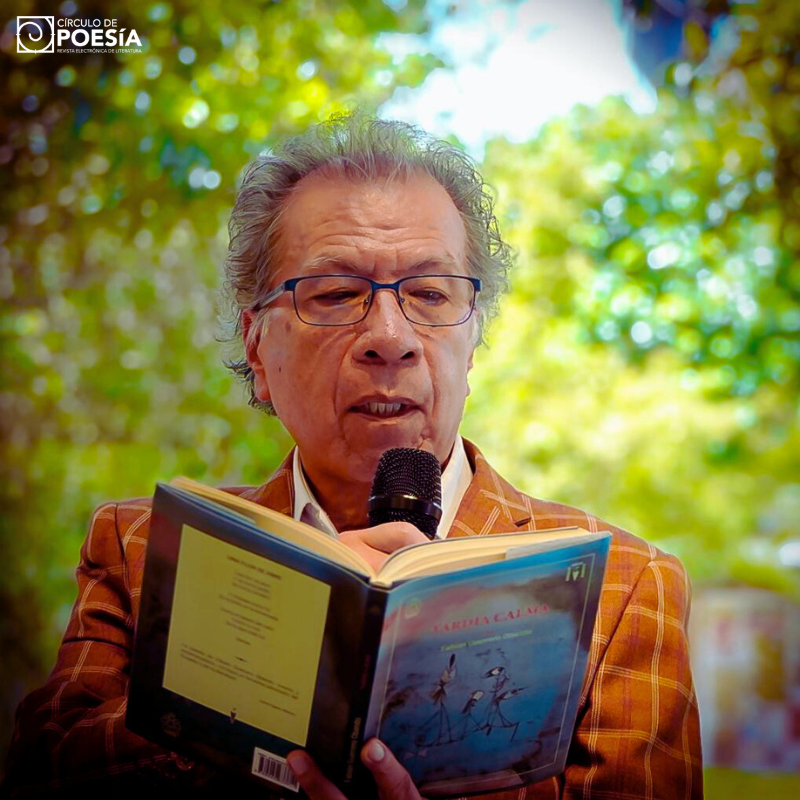All Whitman Laureates at Círculo de Poesía
The Walt Whitman Award 1982
Today at Círculo de Poesía: Anthony Petrosky (Pennsylvania, 1948). Author of three poetry collections: Crazy Love (2003), Red and Yellow Boat (1994), and Jurgis Petraskas (1983), selected by Philip Levine as the winner of the 1982 Walt Whitman Award. He is also the coauthor and coeditor of three scholarly books on education. The Spanish translation presented is by Tania Márquez Aragón.
Presentamos la poesía de Anthony Petrosky (Pensilvania, 1948). Autor de tres poemarios: Crazy Love (2003) Red and yellow Boat (1994) y Jurgis Petraskas (1983), seleccionado por Philip Levine como ganador del premio Walt Whitman en 1982. También es coautor y coeditor de libros académicos. La traducción al español es de Tania Márquez Aragón.
Another theory
Light muted rain
shapes a sycarome,
a maple gone red,
rows of high-rises
rising against the
gray, a dab of red
Huangul, a green
sign illuminated,
flashing to stop
then go, red to
yellow on black
macadam, both
sides outlined by a
languorous weave
of bodies in coats,
umbrellas up, a
few appearances
of oranges, blues,
even some ducks
flat against black
like hypotheses in
this sea of appear-
ances, God’ ad-
versaries, in this
sooty air ablaze
with traffic,
radios, TVs, a
gray that dis-
appears into
glow like eye
into I or see
into be in a
pool of light
that illuminates
poinsettias in a
green plastic pot
on the sidewalk
next to a coil of
black tubes next
to a stack of straw
mats behind the
cart full of tiny
tangerines and an
old woman, a red
apron, two hands
wet with juice.
Otra teoría
Luz muda lluvia
forma un sicomoro,
vuelve rojo un maple,
hilera que se eleva
levanta contra
el gris, un toque rojo
Hangul, un verde
signo iluminado,
parpadea, se detiene
luego se va, de rojo a
amarillo sobre negro
asfalto, ambos lados
trazados por una
ola lánguida de
cuerpos en abrigos,
paraguas arriba,
algunas apariciones
de naranja, azules,
hasta unos patos
se acomodan en lo
negro como hipótesis en
este mar de apariciones,
adversarios de Dios, en este
tiznado espejeo de aire
con tráfico
radios, televisiones,
color nublado que des-
aparece en el brillo
como un ojo
dentro de mi
o lo que veo
dentro de una
alberca de luz
que irradia sobre las
pascuas en una
botella de plástico
dejada en el camino
junto a un espiral de
tubos negros junto
a un montón de paja
enmarañada bajo la
carreta llena de diminutas
mandarinas y una
mujer vieja, un delantal
rojo, dos manos
húmedas con jugo.
Annie
Carole got laid in the back while we drove around.
A guy I just met behind the wheel made jokes.
Carole said to “tell Annie we went to a movie.”
Annie stared at me and said I was a lying little
prick. I don’t know where she got her red hair.
She fried fish on Fridays, chicken on Mondays,
casseroles on Sundays. Laundry on Saturdays.
Frank put a boning knife into his shoulder.
He put her through a window. Barbara,
her youngest, went the next year to the nuns;
Carole had a girl she named Annie, the Frank
died a year later in a cave in. The air stunk.
Annie got rid of his beagles the next day. My
mother, her sister, commented on their absence
and the silent in the alley as if it was a creature
moved in to replace the dogs. Annie harbored
her bitterness in the small rooms of that flat filled with
knickknacks until her brother Mackey died, then
she let go of a torrent of tears that did not end, so
Barbara returned and Annie grew less coherent,
picking at her fingers then at her face until they bled
so much so that it was a relief to all, Barbara said, when
she died that June afternoon with a scream that laid out
like the crack of a whip.
Annie
Carol tuvo sexo en la parte trasera mientras dábamos una vuelta.
El chico, detrás del volante, que recién conocí hacía bromas.
Carole dijo “Dile a Annie que fuimos al cine.”
Annie me miró y dijo que era un pequeño cabrón mentiroso.
No sé dónde se pintó el cabello rojo.
Ella freía pescado los viernes, pollo los Lunes,
preparaba cazuelas los domingos. Lavaba la ropa los sábados.
Frank puso una polea en la cuerda y cicatrices en su cara.
Ella le puso un cuchillo en su hombro. Él la empujó contra la ventana.
Bárbara, la más pequeña, se fue el siguiente año con las monjas;
Carole tuvo una niña que llamó Annie. En un derrumbe,
Frank murió un año después. El aire apestaba.
Annie se deshizo de sus sabuesos al día siguiente.
Mi madre, su hermana, comentó su ausencia
y el silencio en el callejón fue como si una criatura
se instalara para remplazar a los perros.
Annie hospedó su amargura en la pequeña habitación
de esa casa llena de baratijas hasta que su hermano Mackey murió,
entonces dejó salir un torrente interminable de lágrimas,
Bárbara volvió y Annie creció menos cuerda,
cortando sus dedos, luego su cara hasta sangrar tanto
que Bárbara dijo, fue un alivio para todos cuando murió
en esa tarde de Junio con un grito que se extendió
como el azote de un látigo.





